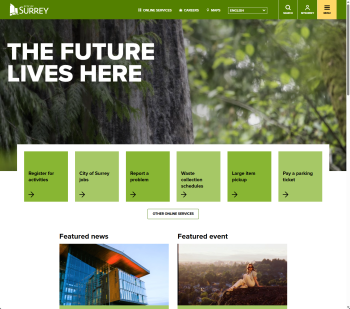City of Surrey
Surrey, British Columbia, incorporated as a municipality in 1879 and a city since 1993, is the largest city by land area and the second most populous in Metro Vancouver (2021 pop. 568,322; est. 662,561 in 2023). It blends urban centres (City Centre, Guildford, Newton, Cloverdale, Fleetwood, South Surrey) with large agricultural and rural zones.
Demographics & Culture
One of Canada’s fastest-growing and most multicultural cities, Surrey’s residents reflect wide diversity: South Asian (38 %), European (31 %), East and Southeast Asian, Black, Indigenous, and Middle Eastern communities. Cultural vibrancy is seen in events like the Vaisakhi parade (500 000+ attendees), Fusion Festival, and Cloverdale Rodeo.
Economy & Infrastructure
A regional economic hub, Surrey’s sectors include tech, clean energy, healthcare, education, manufacturing, agriculture and film, with major employers like Fraser Health, Surrey School District, Coast Capital, Kwantlen Poly and Simon Fraser University’s Surrey campus. It also promotes sustainable urban growth via its Sustainability Charter.
Governance
The city is governed by a mayor–council system. Mayor Brenda Locke (since October 2022) and eight councillors serve on Surrey City Council. The City Manager leads administration and overseeing multiple departments.
Facilities & Recreation
Surrey maintains extensive civic facilities—parks, recreation centres, libraries, arts venues (Surrey Art Gallery, Museum of Surrey), and regional attractions like Cloverdale Rodeo, WinterFest, and Canada Cup fastpitch tournament. Its City Hall offers public space rentals including council chamber and performance stage.
Challenges & Growth
Despite growth and diversity, Surrey faces challenges including suburban sprawl, transportation limits, and coordinating light rail vs. SkyTrain expansions—the current plan includes Expo Line extension to Fleetwood and Langley.
Assessment
Surrey exemplifies rapid suburban transformation into a major Canadian city balancing cultural diversity, economic development, and sustainability. Its numerous festivals, strong civic infrastructure, and growing education and health services strengthen its regional role. Continued focus on transit, urban planning, and inclusive growth is vital to its future.

